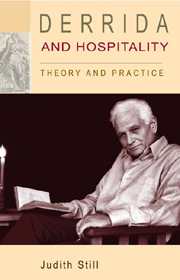Book contents
- Frontmatter
- Contents
- Acknowledgements
- Abbreviations
- 1 Introduction to the question of hospitality: ethics and politics
- 2 Patriarchs and their women, some inaugural intertexts of hospitality: the Odyssey, Abraham, Lot and the Levite of Ephraim
- 3 Friendship and sexual difference: hospitality from brotherhood to motherhood and beyond
- 4 Frenchalgeria – (not) asking for a name, naming, calling by name in tales of Algerians
- 5 The dangers of hospitality: the French state, cultural difference and gods
- 6 Animals and what is human
- 7 Concluding around hospitality
- Bibliography
- Index
7 - Concluding around hospitality
Published online by Cambridge University Press: 12 September 2012
- Frontmatter
- Contents
- Acknowledgements
- Abbreviations
- 1 Introduction to the question of hospitality: ethics and politics
- 2 Patriarchs and their women, some inaugural intertexts of hospitality: the Odyssey, Abraham, Lot and the Levite of Ephraim
- 3 Friendship and sexual difference: hospitality from brotherhood to motherhood and beyond
- 4 Frenchalgeria – (not) asking for a name, naming, calling by name in tales of Algerians
- 5 The dangers of hospitality: the French state, cultural difference and gods
- 6 Animals and what is human
- 7 Concluding around hospitality
- Bibliography
- Index
Summary
Concluding
Should there be a conclusion to this book, on this topic? Can it be an opening up and out to the reader even if – in order to do her best to prepare, adorn (prépare, pare), provide a feast – the writer has to condition a response. The etymology of conclusion is probably well known; in both English and French the term derives from the Latin concludere, con plus claudere which means ‘to shut’. The subject of hospitality would seem to be an open one both in the sense that the living subject should be open (open hearts, doors, frontiers) and also in that the intellectual subject under discussion invites interminable analysis. Yet an end, a close, a finish, or a wind-up of some kind is inevitable, and perhaps it is the preciousness of writers that resists closure, and the drawing (to) a conclusion: the French dictionary Le Petit Robert cites that icon of writerliness Flaubert in its entry for conclure: ‘The obsession with coming to a conclusion is one of the direst manias’ (‘La rage de vouloir conclure est une des manies les plus funestes’). Readers may feel differently, and the same dictionary provides an anonymous imperative and complaint: ‘Conclude! This writer does not know how to finish up’ (‘Concluez! Cet écrivain ne sait pas conclure’). The issue at stake is of course not only the last word in a literal sense, but also an outcome in the sense of a ‘judgement arrived at by reasoning’ (OED). I shall do my best.
- Type
- Chapter
- Information
- Derrida and HospitalityTheory and Practice, pp. 255 - 267Publisher: Edinburgh University PressPrint publication year: 2010



